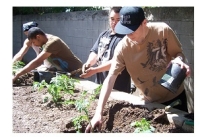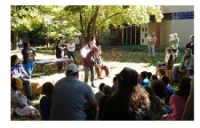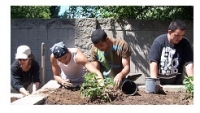Read and Feed: Partnerships for Building Healthy Community
Sacramento Public Library, Calif.
Innovation Synopsis
Challenge/Opportunity
Colonial Heights Library is located in South Sacramento, an underprivileged neighborhood where 25% of the population is at poverty level and 69.9% of neighborhood children are eligible for free and reduced lunches. The neighborhood is referred to as a “food desert” because of the lack of access to fresh fruits and vegetables. The library is located in the center of a Building Healthy Communities initiative; members of the community, including political representatives, are well aware of the issues and have organized themselves in order to address them. We asked ourselves how we could support this community effort and the result was the creation of the Read & Feed Garden and Seed Library, which forms the foundation for an ongoing series of themed programs that support the goals of self-sufficiency and healthy lifestyle choices. As a public library, the challenge was to come up with a service delivery that is unique and does not overlap with other organizations’ methods and products. As a community space and fosterer of literacy, the Library wanted to continue to weave this thread throughout all programming. Another challenge was obtaining the funding for such a large-scale project in uncertain economic times marked by shrinking budgets. This became an opportunity to reach out to potential sponsors and work closely with them through the entire process of planning, building, and programming.
Key Elements of Innovation
Ownership of this project has been the key to its success. From the very beginning we knew that we would need to rely on the community for its expertise and for funding. The Sacramento Area Community Garden Coalition stepped right up to assess a proposed garden site and produce a feasible construction plan, as well as working with the Library every step of the way in the construction. We reached out to and received funding from several sources: • Junior League of Sacramento • Naygrow Family Foundation • Gifts to Share, Inc. • National Gardening Association • Sacramento City Council, District 5 and District 6 The Read & Feed Garden and its related programs are entirely supported by grants, from the local to national level. Incredibly, community members spent more than 600 volunteer hours building the garden. We structured our volunteer work so that people of all ages could help. Work parties served a two-fold purpose -- they got the work done and gave the community ownership. From technical consultants to teenagers gaining service hours for high school to young children removing prickly seed balls and piling them up in a corner of the yard, the garden was built with a collaborative team spirit. The Heirloom Seed Library consists of a wide variety of seeds all donated by organic seed companies across the United States. This program is run by highly skilled library volunteers. Goals would not have been met without the support of funders and volunteers. In a time of shrinking budgets, the community has stepped forward to support a new programming model that they deem important.
Achieved Outcomes
The banner sponsor, the Junior League of Sacramento, has helped the library maintain a full spectrum of programming with their extensive volunteer support base: • Preschoolers experience outdoor storytimes and engage in hands-on gardening experiences. • School-age children attend an after-school garden club and make healthy snacks using vegetables from the garden. • Teens develop their cooperation and leadership skills as they help younger children while planting, maintaining, and harvesting the garden. • Sacramento’s leading urban agricultural organization, Soil Born Farms, and the University of California, Davis, Master Gardeners conduct hands-on gardening and composting classes for adults. Urban-positive library programming is sustainable. The Junior League has made a three-year financial commitment and already has contributed more than 350 in-house volunteer hours since the beginning of the project in April 2012. Program attendance and comments from participants show that our gardening programs are gaining momentum. • “I am thrilled to have the library as an educational center beyond ‘just books.’ Your garden and associated programming around health are invaluable assets and provide a much needed space that is accessible by the entire community to learn about and experience real food production, healthy eating and interacting with our environment.” • “Garden builds were fun. Met a lot of people and learned a lot.” • Thanks for taking a leadership role in developing a healthy garden and interconnected community!” The Colonial Heights Read and Feed Garden has clearly been as success. Plans are under way for a second garden funded by the Junior League at the Rancho Cordova Library.



